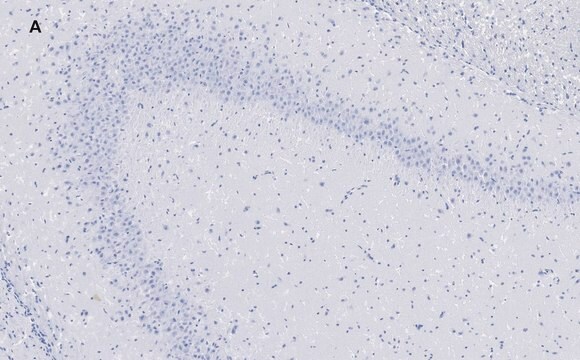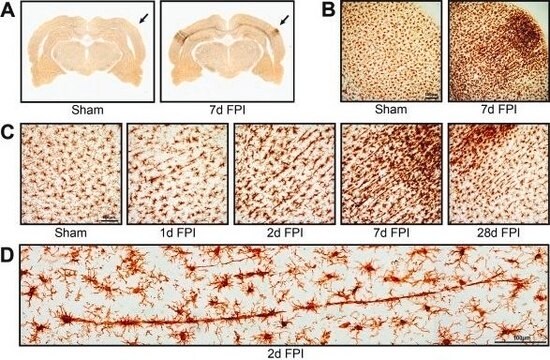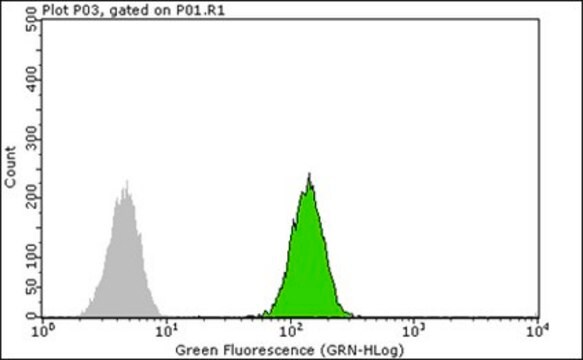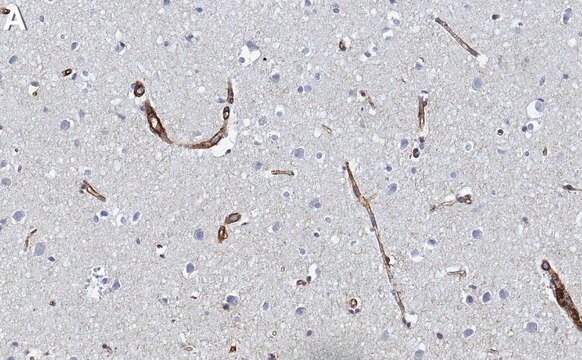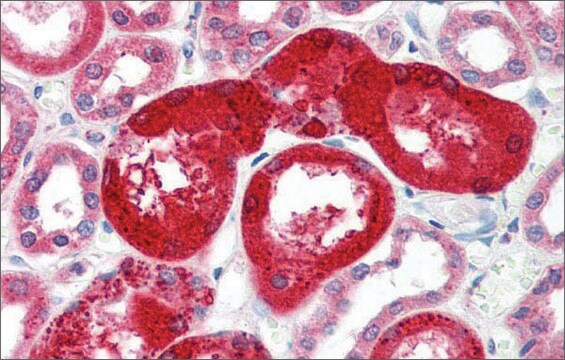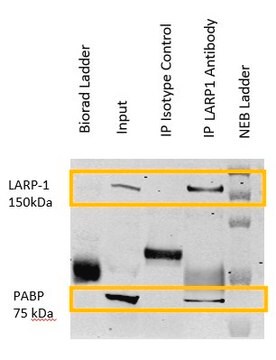おすすめの製品
由来生物
mouse
品質水準
抗体製品の状態
purified antibody
抗体製品タイプ
primary antibodies
クローン
3E3, monoclonal
化学種の反応性
human
テクニック
ELISA: suitable
immunocytochemistry: suitable
immunohistochemistry: suitable
inhibition assay: suitable
western blot: suitable
アイソタイプ
IgG1κ
NCBIアクセッション番号
UniProtアクセッション番号
輸送温度
wet ice
ターゲットの翻訳後修飾
unmodified
遺伝子情報
human ... FN1(2335)
詳細
Fibronectin (FN), or in earlier literature also known as Cold-insoluble globulin (CIG), and is encoded by the gene named FN1/FN is an extracellular matrix protein. Fibronectins bind cell surfaces and various compounds including collagen, fibrin, heparin, DNA, and actin. Fibronectins are involved in cell adhesion, cell motility, opsonization, wound healing, and maintenance of cell shape. Fibronectin also plays an important role in bone development and bone structure formation. Additionally, when fibronectin binds the protein anastellin it forms a multiprotein complex termed superfibronectin that has been shown to inhibit tumor growth, angiogenesis and metastasis. Fibronectin protein can be found extracellularly as well as intracellularly. There are multiple isoforms produced by alternative splicing. Plasma fibronectin (a soluble dimeric form) is secreted by hepatocytes into the blood. Cellular fibronectin (dimeric or cross-linked multimeric forms), are made by fibroblasts, epithelial and other cell types, and is deposited as fibrils in the extracellular matrix.
免疫原
Epitope: This antibody recognizes the cell attachment fragment of Fibronectin.
Purified human Fibronectin, which contains the Cell Attachment Fragment, from amnion liquid.
アプリケーション
Research Category
細胞骨格
細胞骨格
Research Sub Category
ECMタンパク質
ECMタンパク質
This Anti-Fibronectin (Cell Attachment Fragment) Antibody, clone 3E3, Ascites & Azide Free is validated for use in western blotting, IHC, ELISA, ICC & inhibition for the detection of Fibronectin.
Western Blotting Analysis: 0.5 µg/mL of this antibody detected Fibronectin (Cell Attachment Fragment) in 10 µg of U-251 cell lysate.
Immunohistochemistry Analysis: A 1:500 dilution from a representative lot detected Fibronectin (Cell Attachment Fragment) in human placenta and liver tissues.
ELISA Analysis: A representative lot detected the conformation of Fibronectin adsorbed onto self-assembled monolayers (SAMs) of alkanethiols over a range of Fibroectin surface densities (Kesolowsky, B. G., et al. (2003). J Biomed Mater Res A. 66(2):247-259.).
Immuncytochemistry Analysis: A representative lot detected Fibronectin (Cell Attachment Fragment) in Extracellular matrix deposited by HUVECs (Orecchia, A., et al. (2003). J Cell Sci. 116(Pt 17):3479-3489.).
Inhibition Analysis: A representative lot blocked cell-adhesive epitopes of Fibronectin (Cell Attachment Fragment) (Miller, D. C., et al. (2005). J Biomed Mater Res A. 73(4):476-84.).
Inhibition Analysis: A representative lot blocked RGD-dependent cell adhesion (Tsang, T. M., et al. (2012). J Biol Chem. 287(20):16759-16767.).
Inhibition Analysis: A representative lot inhibited the cell-adhesive epitopes of Fibronectin (Miller, D. C., et al. (2005). J Biomed Mater Res. 73(4):476-484.)
Immunohistochemistry Analysis: A 1:500 dilution from a representative lot detected Fibronectin (Cell Attachment Fragment) in human placenta and liver tissues.
ELISA Analysis: A representative lot detected the conformation of Fibronectin adsorbed onto self-assembled monolayers (SAMs) of alkanethiols over a range of Fibroectin surface densities (Kesolowsky, B. G., et al. (2003). J Biomed Mater Res A. 66(2):247-259.).
Immuncytochemistry Analysis: A representative lot detected Fibronectin (Cell Attachment Fragment) in Extracellular matrix deposited by HUVECs (Orecchia, A., et al. (2003). J Cell Sci. 116(Pt 17):3479-3489.).
Inhibition Analysis: A representative lot blocked cell-adhesive epitopes of Fibronectin (Cell Attachment Fragment) (Miller, D. C., et al. (2005). J Biomed Mater Res A. 73(4):476-84.).
Inhibition Analysis: A representative lot blocked RGD-dependent cell adhesion (Tsang, T. M., et al. (2012). J Biol Chem. 287(20):16759-16767.).
Inhibition Analysis: A representative lot inhibited the cell-adhesive epitopes of Fibronectin (Miller, D. C., et al. (2005). J Biomed Mater Res. 73(4):476-484.)
品質
Evaluated by Western Blotting in HepG2 cell lysate.
Western Blotting Analysis: 0.5 µg/mL of this antibody detected Fibronectin (Cell Attachment Fragment) in 10 µg of HepG2 cell lysate.
Western Blotting Analysis: 0.5 µg/mL of this antibody detected Fibronectin (Cell Attachment Fragment) in 10 µg of HepG2 cell lysate.
ターゲットの説明
~260 kDa observed
物理的形状
Protein G Purified
0.01M Phosphate Buffer containing no preservative, pH 7.1
Format: Purified
保管および安定性
Stable for 1 year at -20°C from date of receipt.
Handling Recommendations: Upon receipt and prior to removing the cap, centrifuge the vial and gently mix the solution. Aliquot into microcentrifuge tubes and store at -20°C. Avoid repeated freeze/thaw cycles, which may damage IgG and affect product performance.
Handling Recommendations: Upon receipt and prior to removing the cap, centrifuge the vial and gently mix the solution. Aliquot into microcentrifuge tubes and store at -20°C. Avoid repeated freeze/thaw cycles, which may damage IgG and affect product performance.
その他情報
Concentration: Please refer to the Certificate of Analysis for the lot-specific concentration.
免責事項
Unless otherwise stated in our catalog or other company documentation accompanying the product(s), our products are intended for research use only and are not to be used for any other purpose, which includes but is not limited to, unauthorized commercial uses, in vitro diagnostic uses, ex vivo or in vivo therapeutic uses or any type of consumption or application to humans or animals.
適切な製品が見つかりませんか。
製品選択ツール.をお試しください
保管分類コード
12 - Non Combustible Liquids
WGK
WGK 1
引火点(°F)
Not applicable
引火点(℃)
Not applicable
適用法令
試験研究用途を考慮した関連法令を主に挙げております。化学物質以外については、一部の情報のみ提供しています。 製品を安全かつ合法的に使用することは、使用者の義務です。最新情報により修正される場合があります。WEBの反映には時間を要することがあるため、適宜SDSをご参照ください。
Jan Code
MAB88916-C:
試験成績書(COA)
製品のロット番号・バッチ番号を入力して、試験成績書(COA) を検索できます。ロット番号・バッチ番号は、製品ラベルに「Lot」または「Batch」に続いて記載されています。
Synthetic peptide with cell attachment activity of fibronectin.
Pierschbacher, M, et al.
Proceedings of the National Academy of Sciences of the USA, 80, 1224-1227 (1983)
Detachment of cells from culture substrate by soluble fibronectin peptides.
Hayman, E G, et al.
The Journal of cell biology, 100, 1948-1954 (1985)
M D Pierschbacher et al.
The Journal of biological chemistry, 257(16), 9593-9597 (1982-08-25)
The complete amino acid sequence of the cell attachment domain of human plasma fibronectin (Pierschbacher, M. D., Hayman, E. G., and Ruoslahti, E. (1981) Cell 26, 259-267) has been determined by automated sequential degradation of a peptic fragment comprising this
Arg-Gly-Asp: a versatile cell recognition signal.
Ruoslahti, E and Pierschbacher, M D
Cell, 44, 517-518 (1986)
Christian Woltersdorf et al.
Matrix biology : journal of the International Society for Matrix Biology, 63, 91-105 (2017-02-14)
Interactions of cells with supramolecular aggregates of the extracellular matrix (ECM) are mediated, in part, by cell surface receptors of the integrin family. These are important molecular components of cell surface-suprastructures regulating cellular activities in general. A subfamily of β1-integrins
ライフサイエンス、有機合成、材料科学、クロマトグラフィー、分析など、あらゆる分野の研究に経験のあるメンバーがおります。.
製品に関するお問い合わせはこちら(テクニカルサービス)